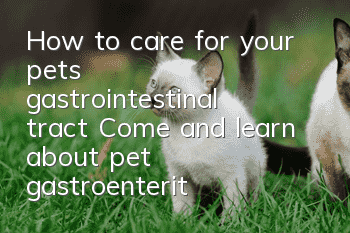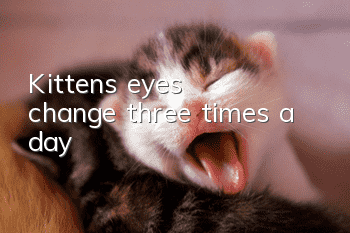How to care for your pet’s gastrointestinal tract? Come and learn about pet gastroenteritis correctly!

As a pet parent, your only wish is that your pet children will be healthy and eat well. You have to pay attention to eating, because the absorption of nutrients is mainly completed in the intestines. Only when the intestines are healthy and functioning properly can pets be healthy.
Intestinal diseases are one of the most common diseases in pets. Let’s take a look at the most common intestinal diseases in dogs and cats: gastroenteritis
Gastroenteritis in dogs and cats
Gastroenteritis is inflammation of the gastric mucosa and intestinal mucosa. Usually caused by microbial infection, it can also be caused by chemical poisons or drugs.
Symptoms of gastroenteritis:
Pets suffering from gastroenteritis are accompanied by symptoms such as vomiting, diarrhea, and fever.
Vomiting——
Many diseases can cause vomiting, the most common of which is problems with the gastrointestinal and other digestive organs. For example: swallowing foreign bodies, food poisoning, and drug poisoning can all cause vomiting.
Diarrhea——
During diarrhea, water will be excreted from the body along with the feces. If there is too much water, it will become liquid, which can easily cause dehydration.
Fever——
The body temperature of dogs and cats is slightly higher than that of humans, and many diseases can cause fever. Inflammation caused by gastroenteritis is often accompanied by fever.
Common causes of gastroenteritis:
Common causes of gastroenteritis can be divided into non-disease factors and disease factors.
Non-disease factors——
Stress, bad eating habits (eating too fast, strenuous exercise after meals, etc.), sudden changes in feeding amount and food, indigestion, etc. These can cause gastroenteritis in pets, but parents don’t need to worry too much.
Disease factors——
1. Bacterial and viral infections, especially viral infections, including parvovirus, coronavirus, rotavirus, etc.
2. There are parasites in the intestines, including roundworms, whipworms, hookworms, etc.
3. Food poisoning, drug poisoning
4. Caused by diseases of other organs
For gastroenteritis caused by disease factors, you must go to the pet hospital for treatment immediately and follow the doctor's advice.
How to prevent intestinal diseases in daily life?
1. Correct bad eating habits
For pets that wolf down their meals, you can replace them with a slow-feeding basin to delay eating and help digestion. Do not take your pet for exercise immediately after a meal.
Do not feed pets human food, choose natural and hypoallergenic dog and cat food. When changing food, it should be done step by step to allow the stomach and intestines to adapt.
2. Ensure the freshness of food
The hot and humid summer is when germs multiply most actively, which is also the main reason for the high incidence of intestinal diseases in summer. Therefore, we must try our best to let our pets eat fresh and clean water and food.
It is best for young and elderly pets to eat small meals frequently. Do not leave food for a long time to prevent it from spoiling. It is best to place dog and cat food in a dry, ventilated place, seal the opening, and eat it as soon as possible after opening the bag.
3. Regular immunization and deworming
In order for pets to resist the invasion of common infectious diseases, vaccinations are needed to stimulate the immune system in their bodies to produce antibodies, which can help pets gain resistance to viruses and reduce the risk of infection.
In addition to preventive injections, regular deworming is also required to prevent the occurrence of intestinal parasites and reduce the possibility of intestinal diseases.
4. Feed pets probiotics
When pets have gastrointestinal discomfort, they will be accompanied by symptoms such as vomiting, diarrhea, and loss of appetite. If parents do not pay attention to the symptoms in the early stages, they may develop into serious intestinal diseases.
During the daily health care period, intestinal diseases can be prevented by feeding probiotics. Probiotics can regulate the intestinal bacterial ecology, reduce the growth of harmful bacteria, help food digestion, enhance the body's protection, and reduce the risk of pets suffering from gastroenteritis.
- How to treat skin diseases in kittens
- Why do Havana brown cats need to be neutered?
- Why does Garfield have so many tear stains? What can I do if I can’t wipe away Garfield’s tear stains?
- Can cats eat dog food for emergencies?
- What happens when a cat twitches?
- How to feed Russian Blue cats?
- Why are all calico cats female?
- What are the wrong ways to raise a cat?
- What should I do if my cat is picky about food? Teach you how to solve the problem of picky food in cats
- What should I do if my cat overdoses on anthelmintics twice as much?



